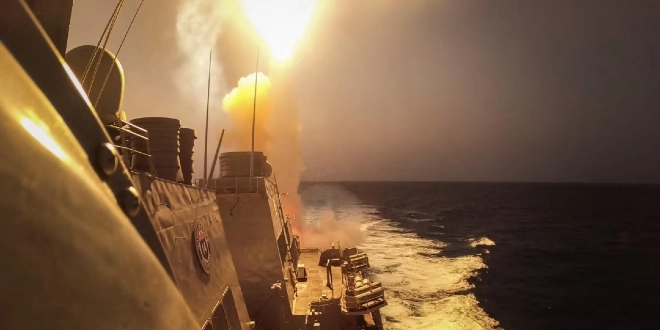The U.S. Navy’s senior commander in the Middle East, Vice Admiral Brad Cooper, has highlighted Iran’s substantial involvement in maritime attacks conducted by Yemen’s Houthi rebels, particularly during the conflict between Israel and Hamas. In an interview with The Associated Press, Cooper did not explicitly state that Tehran orchestrates each attack by the Houthis in the Red Sea and Gulf of Aden but acknowledged the expansion of Iran-linked attacks beyond the Persian Gulf and Strait of Hormuz to broader Middle Eastern waters.
Cooper emphasized the gravity of the Houthis’ actions against merchant shipping, describing these as the most significant in the last two generations. He noted these attacks target the international community, leading to a global response. Despite requests for comments, Iran’s United Nations mission and Houthi leadership in Yemen’s capital, Sanaa, did not immediately respond.
Since November, the Houthis, supported by Iran, have initiated over 34 attacks on shipping lanes leading to Egypt’s Suez Canal, a crucial route for Asian and Middle Eastern energy and cargo shipments to Europe. These attacks, linked to the Israel-Hamas conflict, often target vessels with little or no connection to Israel.
In response to these threats, the U.S. has conducted airstrikes against Houthi military targets and increased naval patrols in the region, which has temporarily slowed Houthi attacks. However, the global economy faces risks as many ships now avoid these routes, opting for longer journeys around Africa, affecting Egypt’s Suez Canal revenue and potentially contributing to global inflation.
Cooper, who took command of the 5th Fleet in 2021, initially focused on threats in the Persian Gulf and the Strait of Hormuz. Following the collapse of Iran’s nuclear deal with world powers, the region witnessed a series of Iran-blamed attacks and ship seizures. Cooper now acknowledges the threat from Iran’s proxies and their weapon distribution reaching from the Red Sea to the Indian Ocean. He blames Iran for recent drone attacks on shipping and mentions a U.S.-owned cargo vessel attacked by the Houthis in the Gulf of Aden.
Although Iran has not directly engaged Israel or the U.S. since the Gaza war began on October 7, Cooper asserts that Iran significantly fuels Houthi attacks on shipping, providing funding, resources, training, and supplies. He likens the current maritime conflict in the Middle East to the 1980s Tanker War, noting its significant impact, including a one-day naval battle between the U.S. and Tehran and the accidental downing of an Iranian passenger jet by America.
Under Cooper’s leadership, the 5th Fleet has developed Task Force 59, a drone fleet enhancing regional waterway patrols. These drones cover an extensive area, aiding in interdiction operations against drug and weapon shipments. Notably, U.S. forces recently seized Iranian-made missile parts destined for the Houthis, an operation during which two Navy SEALs were believed to have been lost.
As Rear Admiral George Wikoff prepares to succeed Cooper in February, the departing commander emphasizes the ongoing serious threat from the Houthis to merchant shipping and the need for a decisive Houthi commitment to cease these attacks.


